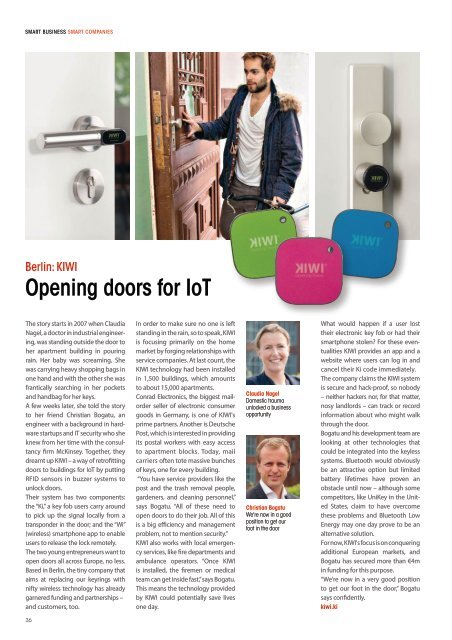Smart Industry 1/2018
Smart Industry 1/2018 - The IoT Business Magazine - powered by Avnet Silica
Smart Industry 1/2018 - The IoT Business Magazine - powered by Avnet Silica
You also want an ePaper? Increase the reach of your titles
YUMPU automatically turns print PDFs into web optimized ePapers that Google loves.
<strong>Smart</strong> Business SMART Companies<br />
Berlin: KIWI<br />
Opening doors for IoT<br />
The story starts in 2007 when Claudia<br />
Nagel, a doctor in industrial engineering,<br />
was standing outside the door to<br />
her apartment building in pouring<br />
rain. Her baby was screaming. She<br />
was carrying heavy shopping bags in<br />
one hand and with the other she was<br />
frantically searching in her pockets<br />
and handbag for her keys.<br />
A few weeks later, she told the story<br />
to her friend Christian Bogatu, an<br />
engineer with a background in hardware<br />
startups and IT security who she<br />
knew from her time with the consultancy<br />
firm McKinsey. Together, they<br />
dreamt up KIWI – a way of retrofitting<br />
doors to buildings for IoT by putting<br />
RFID sensors in buzzer systems to<br />
unlock doors.<br />
Their system has two components:<br />
the “Ki,” a key fob users carry around<br />
to pick up the signal locally from a<br />
transponder in the door; and the “Wi”<br />
(wireless) smartphone app to enable<br />
users to release the lock remotely.<br />
The two young entrepreneurs want to<br />
open doors all across Europe, no less.<br />
Based in Berlin, the tiny company that<br />
aims at replacing our keyrings with<br />
nifty wireless technology has already<br />
garnered funding and partnerships –<br />
and customers, too.<br />
In order to make sure no one is left<br />
standing in the rain, so to speak, KIWI<br />
is focusing primarily on the home<br />
market by forging relationships with<br />
service companies. At last count, the<br />
KIWI technology had been installed<br />
in 1,500 buildings, which amounts<br />
to about 15,000 apartments.<br />
Conrad Electronics, the biggest mailorder<br />
seller of electronic consumer<br />
goods in Germany, is one of KIWI's<br />
prime partners. Another is Deutsche<br />
Post, which is interested in providing<br />
its postal workers with easy access<br />
to apartment blocks. Today, mail<br />
carriers often tote massive bunches<br />
of keys, one for every building.<br />
“You have service providers like the<br />
post and the trash removal people,<br />
gardeners, and cleaning personnel,”<br />
says Bogatu. “All of these need to<br />
open doors to do their job. All of this<br />
is a big efficiency and management<br />
problem, not to mention security.”<br />
KIWI also works with local emergency<br />
services, like fire departments and<br />
ambulance operators. “Once KIWI<br />
is installed, the firemen or medical<br />
team can get inside fast,” says Bogatu.<br />
This means the technology provided<br />
by KIWI could potentially save lives<br />
one day.<br />
Claudia Nagel<br />
Domestic trauma<br />
unlocked a business<br />
opportunity<br />
Christian Bogatu<br />
We're now in a good<br />
position to get our<br />
foot in the door<br />
What would happen if a user lost<br />
their electronic key fob or had their<br />
smartphone stolen? For these eventualities<br />
KIWI provides an app and a<br />
website where users can log in and<br />
cancel their Ki code immediately.<br />
The company claims the KIWI system<br />
is secure and hack-proof, so nobody<br />
– neither hackers nor, for that matter,<br />
nosy landlords – can track or record<br />
information about who might walk<br />
through the door.<br />
Bogatu and his development team are<br />
looking at other technologies that<br />
could be integrated into the keyless<br />
systems. Bluetooth would obviously<br />
be an attractive option but limited<br />
battery lifetimes have proven an<br />
obstacle until now – although some<br />
competitors, like UniKey in the United<br />
States, claim to have overcome<br />
these problems and Bluetooth Low<br />
Energy may one day prove to be an<br />
alternative solution.<br />
For now, KIWI's focus is on conquering<br />
additional European markets, and<br />
Bogatu has secured more than €4m<br />
in funding for this purpose.<br />
“We're now in a very good position<br />
to get our foot in the door,” Bogatu<br />
says confidently.<br />
kiwi.ki<br />
36
















